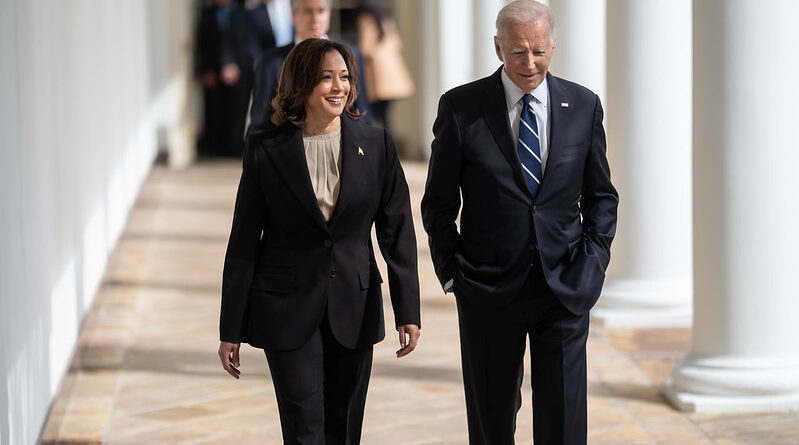The Power of Women: Biden-Harris Push For Equal Pay on Lilly Ledbetter Fair Pay Act Anniversary
Heading into an election in which the votes of women are critical, the Biden-Harris administration is marking the 15th anniversary of the very first bill of the Obama-Biden administration, the Lily Ledbetter Fair Pay Act, with further actions to help close wage gaps and improve pay transparency.
“Women workers are still paid on average 84 cents for every dollar paid to men, and the disparities are even greater for many women of color. Today, my Administration is taking new actions to advance pay equity for the federal workforce and employees of federal contractors. These new actions adopt commonsense policies that will help pay millions of workers fairly, close gender and racial wage gaps, and yield tangible benefits for the federal government and federal contractors. These policies are good for workers, our economy, and for families,” President Biden said in a statement provided to PoliticusUSA.
Every year when the Lilly Ledbetter Act comes up, critics of the Fair Pay Act argue that there’s no discrepancy and if there is a discrepancy, it’s because women aren’t as qualified. But Pew found that indeed in 2022, American women “typically earned 82 cents for every dollar earned by men,” and the “pay gap persists even though women today are more likely than men to have graduated from college.”
It’s even worse for women of color. “In 2022, Black women earned 70% as much as White men and Hispanic women earned only 65% as much. The ratio for White women stood at 83%, about the same as the earnings gap overall, while Asian women were closer to parity with White men, making 93% as much.”
The actions announced Monday will impact pay equity and disclosure/transparency around pay with federal workers and contractors. White House Director of the New Policy Council Jennifer Kline explained during a call with reporters, in which we participated, that this will serve as a model that is good for employees and employers, in addition to strengthening the economy.
In what she described as a “major step forward,” the Director of the Office of Management and Budget Shalanda Young said OPM is announcing a new regulation that will “prohibit the use of salary history in setting pay for role in the federal government” as well as the Federal Acquisition Regulatory Council publishing a proposed rule to prohibit federal contractors from “seeking and considering information about job applicants past compensation when making employment decisions.”
Young explained, “Relying on a candidate’s salary history can exacerbate pre-existing inequality and our pay structures and disproportionately impact women and workers of color,” adding that this had actually happened to her earlier in her career, which is a good example of why having people with different backgrounds and experiences at the table matters.
The federal government in 2022 had a much lower pay gap (5.6%-under 1% at senior level) than the national gender pay gap (16%), but still has room for improvement, and it is the only area over which the President can exert control.
“Under this new regulation. Federal agencies will not considering applicants non federal salary history when setting pay for new employees. Relying on a candidate candidate salary history can exacerbate great existing inequality, and disproportionately impacts women and workers of color,” Director of the Office of Personnel Management Kiran Ahuja said on the call.
This is called leading by example.
The President also called on Congress to “pass the Paycheck Fairness Act, to increase pay transparency and strengthen our tools to fight sex-based pay discrimination,” although we can be sure the Republican-led House will not take any interest in protecting pay for women.
It is in perhaps seemingly small and certainly missed actions like these that an administration tells the people what they stand for. It’s about where they flex and where they put their resources. For women, the pay gap is not only demoralizing and unjust, but it can add up to millions of dollars over a lifetime.
There’s something poignant about Biden getting to add to the first Act of the Obama-Biden administration at this stage in his career. The President is no stranger to awareness of women’s issues, though, having submitted in 1990 a proposal to address violence against women which eventually became the Violence Against Women Act. That act centered around provisions on rape, included the first federal criminal law against battering and addressed stalking, as well as funding for victim services and evidentiary matters. The work took four years to pass, due in part to resistance from then Chief Justice William Rehnquist, a Republican.
Having a President who sees these injustices as something worth fighting to change is a far cry from the last one, whose actions against women ultimately led to the Me Too movement and who has just been told by a jury that he must pay his rape victim $83.3 million for defaming her.
Listen to Sarah on the PoliticusUSA Pod on The Daily newsletter podcast here.
Sarah has been credentialed to cover President Barack Obama, then VP Joe Biden, 2016 Democratic presidential candidate Hillary Clinton, and exclusively interviewed Speaker Nancy Pelosi multiple times and exclusively covered her first home appearance after the first impeachment of then President Donald Trump.
Sarah is two-time Telly award winning video producer and a member of the Society of Professional Journalists.
Connect with Sarah on Post, Mastodon @PoliticusSarah@Journa.Host, & Twitter.



